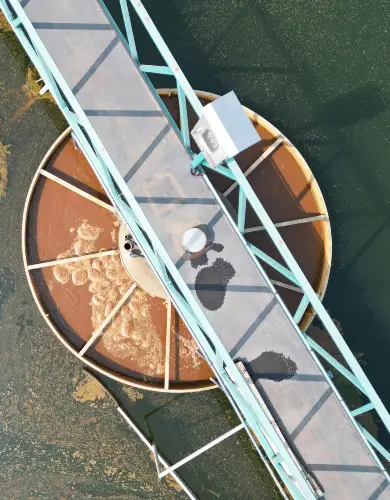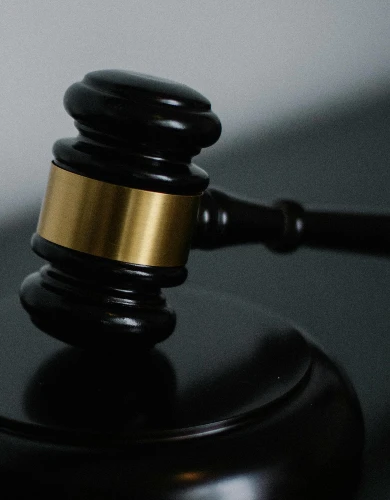Commercial water leaks
Water leaks can cause significant financial problems for businesses through property damage and unexpectedly expensive business water bills.
It’s crucial to find and fix suspected leaks as soon as possible.
This guide is designed to help business owners identify, find, fix, and prevent commercial water leaks. Use the links below to navigate to the key parts of our guide:
- Signs of a water leak.
- Finding your water leak.
- Fixing your water leak.
- Preventing future water leaks.
- Who is responsible for a water leak?
What are the signs of water leaks?
Our water experts have summarised the top indicators that suggest a water leak on your commercial property.
We’ve divided the signs of water leaks into significant leaks that should be addressed immediately and indicators of smaller leaks.
Significant water leak indicators
- Boggy ground – An area of saturated ground can indicate a leak originating from an underground water supply pipe.
- Subsidence – Subsidence occurs when the ground underneath a property starts to sink. It reveals itself through minor changes to your business property, such as sticking windows and doors, ripples in wallpaper, or cracks running along walls.
- Sound of running water – Hearing water running when all appliances and taps are turned off might indicate a pipe leak.
- Reduced water pressure – A sudden decrease in water pressure could be caused by a leak in the plumbing system.
If you notice any of the above signs, we recommend immediately shutting off the water supply to your property and seeking professional help to locate and fix the leak.
Small water leak indicators
- Visible water stains – Discolouration or stains on ceilings, walls, or floors can indicate a leak behind or above those surfaces.
- Mould growth – Excess moisture from a leak can lead to mould or mildew growth, especially in bathrooms and basements.
- Musty odours – Persistent earthy smells are associated with mould or mildew and can indicate a hidden leak.
- Peeling paint or wallpaper – Excess moisture from a leak can cause paint or wallpaper to peel or bubble.
If you notice signs of a small water leak at your property, we recommend following the steps below to use your water meter to confirm the leak.
Checking a small water leak
You can use your water meter to check whether you’re losing water to a leak within your property by following these steps
- Turn off all appliances on your property that use water – Doing this over a weekend or overnight is easiest when the building is not in use.
- Locate your water meter – It’s usually under a cover on the pavement outside your property. Here’s a link to our visual guide for finding your business water meter.
- Take a meter reading – Record the numbers on the front of your meter. Here’s our guide to water meter readings for further details. Make a note of the time you do this.
- Wait a few hours – You’ll need to wait a few hours for the water lost to your leak to be measurable.
- Take another meter reading – If the figure on your meter has increased since the first reading, then this represents water lost to your leak.
- Measure your leak rate – Calculate the rate at which you’re losing water to the leak each hour. This is done by subtracting the first reading from the second and then dividing by the number of hours between the meter readings.
How to find a water leak in a commercial building
Once you’ve spotted a sign that you have a water leak, it’s often easy to find the leaking pipe.
However, if you can’t locate your leak, we recommend contacting a professional water leak detection contractor who will be able to use leak detection technologies to pinpoint the leak.
Professional leak detection technologies for your business
Using a leak detection specialist is the best way to pinpoint a water leak at your commercial property. Locating the precise location of a leak minimises the work required to fix it.
Leak detection professionals will use the following advanced techniques for detecting and locating leaks at a commercial property, including:
- Ultrasonic listening devices – These devices detect the sound of water escaping from pipes and can identify leaks in walls, floors or underground.
- Ground microphones – Specialised ground microphones can help pinpoint the exact location of leaks, especially in underground or hard-to-reach pipes.
- Thermal imaging – Thermal imaging can detect temperature differences caused by moisture, revealing leaks behind walls, ceilings, or under floors.
Fixing a leak on your commercial property
If you have a water leak at your commercial property, we recommend the following steps.
If a leak is identified outside the network of pipes bound by your water meter, it will be the responsibility of the local water company to fix it (Thames Water, etc.). In this case, we recommend contacting your local water company to inform them of the problem.
If the leak is within your property’s boundary, the cost of repairs will fall to the property owner or occupier.
Here are the key steps to fixing a commercial water leak.
Shutting off your water supply
If your property has a significant water leak, we recommend shutting off the water supply to prevent further water loss and property damage. Typically, at the boundary of your property, next to the water meter, you’ll find a stopcock valve that can be used to turn off the connection between your property and the water mains.
Alternatively, if you know the leak’s location, you can isolate the water fittings at the affected part of the property.
Contact your business water supplier
Some business water suppliers have dedicated leakage teams to help their customers by repairing water leaks.
We recommend contacting your business water supplier first to see if they can offer any support. This may be more cost-effective than going directly to a local professional.
Here’s our guide to finding out who your business water supplier is.
Contacting a professional
Unless you possess the necessary experience and expertise in plumbing repairs, you should engage a professional plumber or water damage restoration service to assess and repair the leak.
We recommend seeking a licensed and reputable contractor with experience in commercial properties in your local area.
Preventing commercial water leaks
Although the measures for preventing water leaks depend on the size of your commercial property and how it uses water, here are a few key tips for preventing commercial water leaks:
- Upgrade to a smart water meter – A smart water meter continuously monitors your business water consumption. Simple alerts can inform you of any significant, unusual increases in water consumption that may indicate a water leak.
- Install water loggers – Businesses with large properties can install their own water loggers to separately measure water consumption at different parts of a commercial property.
- Regular inspections – Your maintenance team should regularly check plumbing systems, including pipes, taps, and water-using appliances, for signs of leaks.
- Plumbing maintenance – Schedule regular maintenance for your plumbing systems. This should include checking for corroded pipes, worn-out seals, or loose fittings and repairing or replacing them as necessary.
- Insulate external pipes – In Britain, pipes freezing and bursting in the winter are a common cause of water leaks. To prevent freezing, insulation is recommended for water pipes exposed to outside temperatures.
- Building insurance – We recommend securing a commercial building insurance policy that covers any losses associated with water leaks.
Who is responsible for a business water leak?
Water companies are typically responsible for pipework up to the stopcock valve located at the property boundary of business water connections.
For a diagram of this, see our article on water pipes and who is responsible.
A leak before the water meter
Water meters are typically situated at the boundary of a commercial property.
If the leak occurs before the water meter (i.e., outside the boundary of your property), it is the responsibility of your local water company.
We recommend informing your local water company of the leak as soon as possible to help minimise the environmental impact of leaked water.
A leak after the water meter
If the leak occurs after the water has flowed through your water meter and is within your property’s boundary, the local water company is not responsible.
Depending on your lease agreement, the occupier or the owner is responsible for repairing the leak.
Additionally, the occupier will be responsible for paying for the water lost because of the leak.
What if my water meter appears to be leaking?
Water leaks around your water meter are common, as this is where the supply pipes within your property connect to the local water infrastructure.
An indication of this issue is if the water meter box, which is embedded in the pavement next to your commercial property, is filled with water, submerging your water meter.
In this scenario, we recommend contacting your business water supplier to arrange for a repair as soon as possible since the problem likely stems from the installation of the water meter.
After the issue has been resolved, it’s also wise to consider a business water audit. This could enable you to recover excess business water rates charged during the leak.

